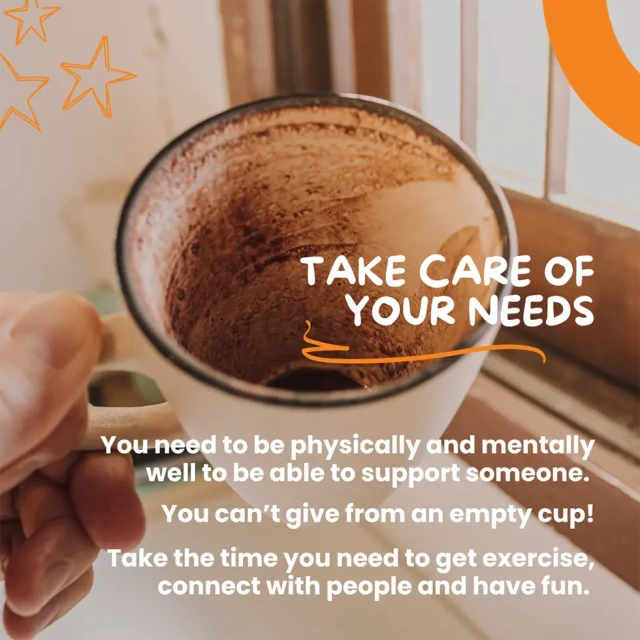How support people can develop resilience
Some ideas about how to keep yourself healthy so you can continue to be a great carer.
On this page
- Ask for help
- Be kind to yourself
- Encourage your loved one to be independent
- Take care of your needs
- Acknowledgements
Being a support person can be incredibly rewarding but also challenging.

The energy required to provide for the needs of a family member or loved one can be physically and emotionally draining. It’s important to develop resilience so you can overcome the challenges you face and provide the best care. But that can be easier said than done, especially when you’re going through a tough time.
Here are some suggestions that might help you when you’re struggling.
Ask for help
Being an informal caregiver can be really tough. Acknowledge when you’re struggling and ask for help.
Don’t be afraid to turn to others for support, either for yourself or for your family member.
Be specific about what aspect of your role you are struggling with, for example, dealing with medication, moving and handling your family member, and getting the right support. Discuss this with your GP, your needs assessor, occupational therapist, or other health professional.
If family or friends offer to help so you can take a break for a few days, or even a few hours, take them up on the offer. Try to do this regularly so you don’t burn out.
Sometimes family or friends want to help but they don’t know how. You could be specific and suggest tasks that can be easily shared, like taking your family member to an appointment or cooking a meal.
Be kind to yourself
Acknowledge that being a support person or carer can be really tough at times.
Don’t be too hard on yourself when you get tired or grumpy. Remember that being a carer is a huge job and sometimes the role will get overwhelming.
It can help to talk to someone about it. Talk to someone supportive about how you’re feeling.
You could also contact a mental health helpline and talk to someone who can listen objectively.
Encourage your loved one to be independent
Sometimes as a support person, the person you’re caring for can become dependent on you.
This can happen because it’s often easier and faster for you to do tasks for them.
However, this pattern can become overwhelming for you because you’re doing so much. It also takes away agency from the person you’re caring for.
Try to encourage your family member to do as much as possible themselves. It may take a bit longer this way, but it will pay off in the long run. They will experience higher self-esteem and feelings of self-worth.
You can help your family member remain independent by ensuring they continue to make choices for themselves. For example, let them decide what to wear, what to buy, and what to eat.
If this becomes more difficult as their abilities decline, then give them a choice of two things.
When you’re completing a task with your family member, let them finish the last step, which will give them a feeling of accomplishment.
Take care of your needs

As a support person, you give so much of yourself to the person you’re caring for that it can be easy to neglect your needs.
But if you neglect your own needs it can be hard for you to be the best carer for your loved one.
You need to be physically well to maintain your role as carer. Try to get regular exercise to give yourself more strength and energy.
It’s also important to look after your mental health. Make time to do activities you enjoy, whether they be hobbies, sports, or social engagements.
Don’t forget to laugh. Keeping your sense of humour is important to retaining your wellbeing, especially when times get tough.
Ask for more formal support if you need it. This could be more personal care hours, or more respite care.
Find out about getting home help
If you can’t get more paid support, consider funding it yourself. It could be worth spending the money if it gives you greater wellbeing.
Learn more about self-funding options
Acknowledgements
This information was adapted from an unpublished Master's thesis, 'Choosing to Care or Hobson's Choice', by Elizabeth Edens.